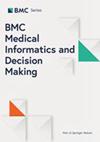RCC-Supporter:利用机器学习支持肾细胞癌治疗决策
IF 3.3
3区 医学
Q2 MEDICAL INFORMATICS
引用次数: 0
摘要
被确诊为肾细胞癌的人群,尤其是在亚洲,占全球病例的 36.6%,韩国的肾细胞癌发病率每年都在稳步上升。然而,根据临床分期和组织学特征,肾细胞癌的治疗方案多种多样。因此,本研究旨在开发一种基于机器学习的临床决策支持系统,根据每位患者的个人健康状况推荐个性化治疗方案。我们回顾了韩国釜山大学梁山医院在 2008 年 11 月至 2021 年 6 月期间诊断出患有肾细胞癌的 1867 名参与者的真实医疗数据。数据被人工分为未接受手术或化疗的随访组(监测组)、接受手术的随访组(手术组)和术前或术后接受化疗的随访组(化疗组)。通过特征选择,从 2058 个特征中找出影响肾细胞癌治疗决策的重要临床因素。这些特征包括 20、50、75、100 和 150 个子集,以及整套特征和另外 50 个专家选择的特征。我们应用了代表性的机器学习算法,即决策树、随机森林和梯度提升机(GBM)。我们分析了三种应用机器学习算法的性能,其中 GBM 算法在 100 和 150 个特征集上的准确率达到了 95%(95% CI,92-98%)。使用 100 和 150 个特征的 GBM 算法比使用临床专家选择的特征的算法取得了更好的性能(93%,95% CI 89-97%)。我们应用机器学习(ML)算法开发了一个名为 "RCC-Supporter "的初步个性化治疗决策支持系统(TDSS),以针对 RCC 患者的各种临床情况确定个性化治疗方案。我们的研究结果证明了在实际临床环境中使用基于机器学习的临床决策支持系统进行治疗决策的可行性。本文章由计算机程序翻译,如有差异,请以英文原文为准。
RCC-Supporter: supporting renal cell carcinoma treatment decision-making using machine learning
The population diagnosed with renal cell carcinoma, especially in Asia, represents 36.6% of global cases, with the incidence rate of renal cell carcinoma in Korea steadily increasing annually. However, treatment options for renal cell carcinoma are diverse, depending on clinical stage and histologic characteristics. Hence, this study aims to develop a machine learning based clinical decision-support system that recommends personalized treatment tailored to the individual health condition of each patient. We reviewed the real-world medical data of 1,867 participants diagnosed with renal cell carcinoma between November 2008 and June 2021 at the Pusan National University Yangsan Hospital in South Korea. Data were manually divided into a follow-up group where the patients did not undergo surgery or chemotherapy (Surveillance), a group where the patients underwent surgery (Surgery), and a group where the patients received chemotherapy before or after surgery (Chemotherapy). Feature selection was conducted to identify the significant clinical factors influencing renal cell carcinoma treatment decisions from 2,058 features. These features included subsets of 20, 50, 75, 100, and 150, as well as the complete set and an additional 50 expert-selected features. We applied representative machine learning algorithms, namely Decision Tree, Random Forest, and Gradient Boosting Machine (GBM). We analyzed the performance of three applied machine learning algorithms, among which the GBM algorithm achieved an accuracy score of 95% (95% CI, 92–98%) for the 100 and 150 feature sets. The GBM algorithm using 100 and 150 features achieved better performance than the algorithm using features selected by clinical experts (93%, 95% CI 89–97%). We developed a preliminary personalized treatment decision-support system (TDSS) called “RCC-Supporter” by applying machine learning (ML) algorithms to determine personalized treatment for the various clinical situations of RCC patients. Our results demonstrate the feasibility of using machine learning-based clinical decision support systems for treatment decisions in real clinical settings.
求助全文
通过发布文献求助,成功后即可免费获取论文全文。
去求助
来源期刊
CiteScore
7.20
自引率
5.70%
发文量
297
审稿时长
1 months
期刊介绍:
BMC Medical Informatics and Decision Making is an open access journal publishing original peer-reviewed research articles in relation to the design, development, implementation, use, and evaluation of health information technologies and decision-making for human health.

 求助内容:
求助内容: 应助结果提醒方式:
应助结果提醒方式:


